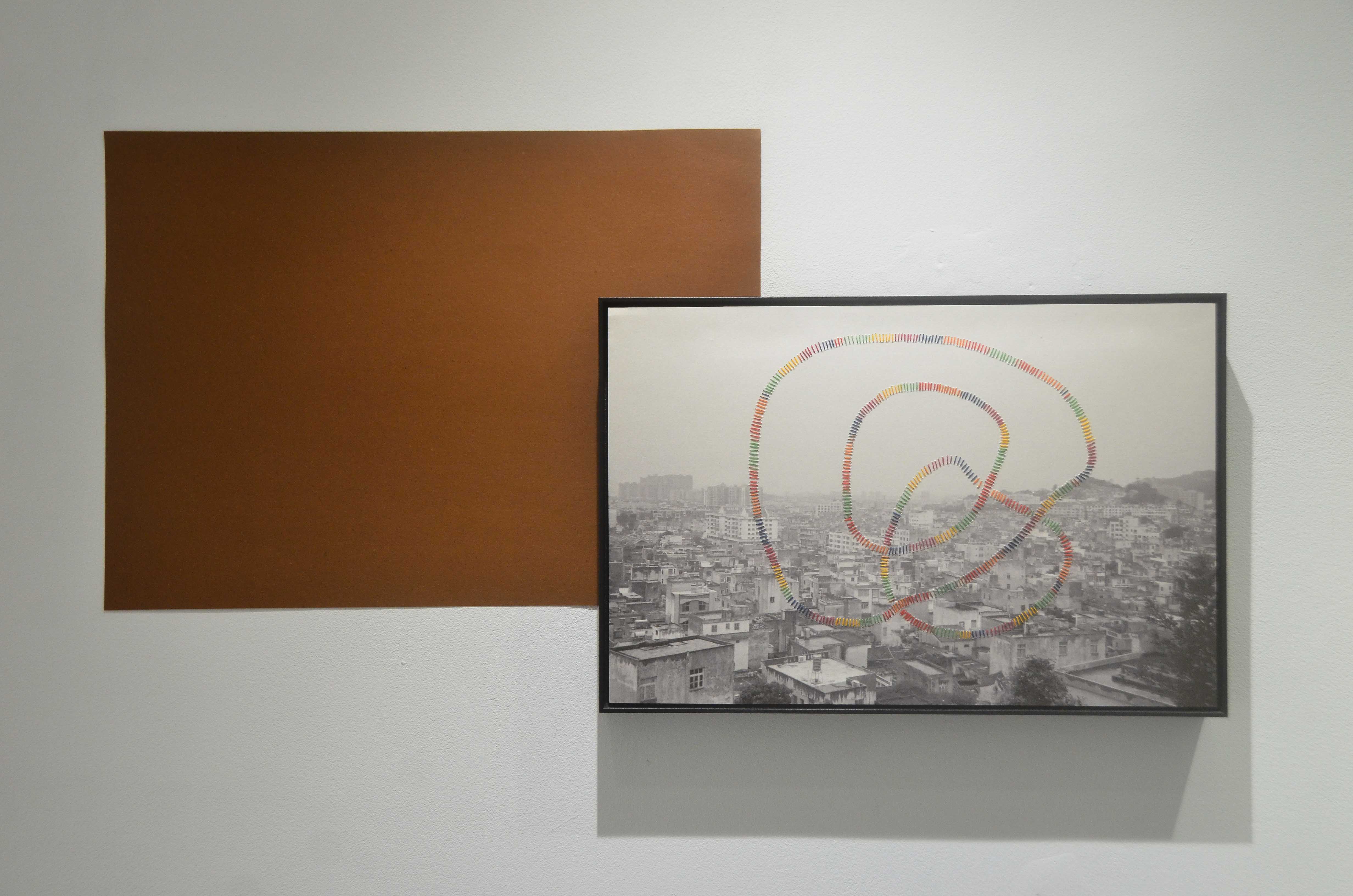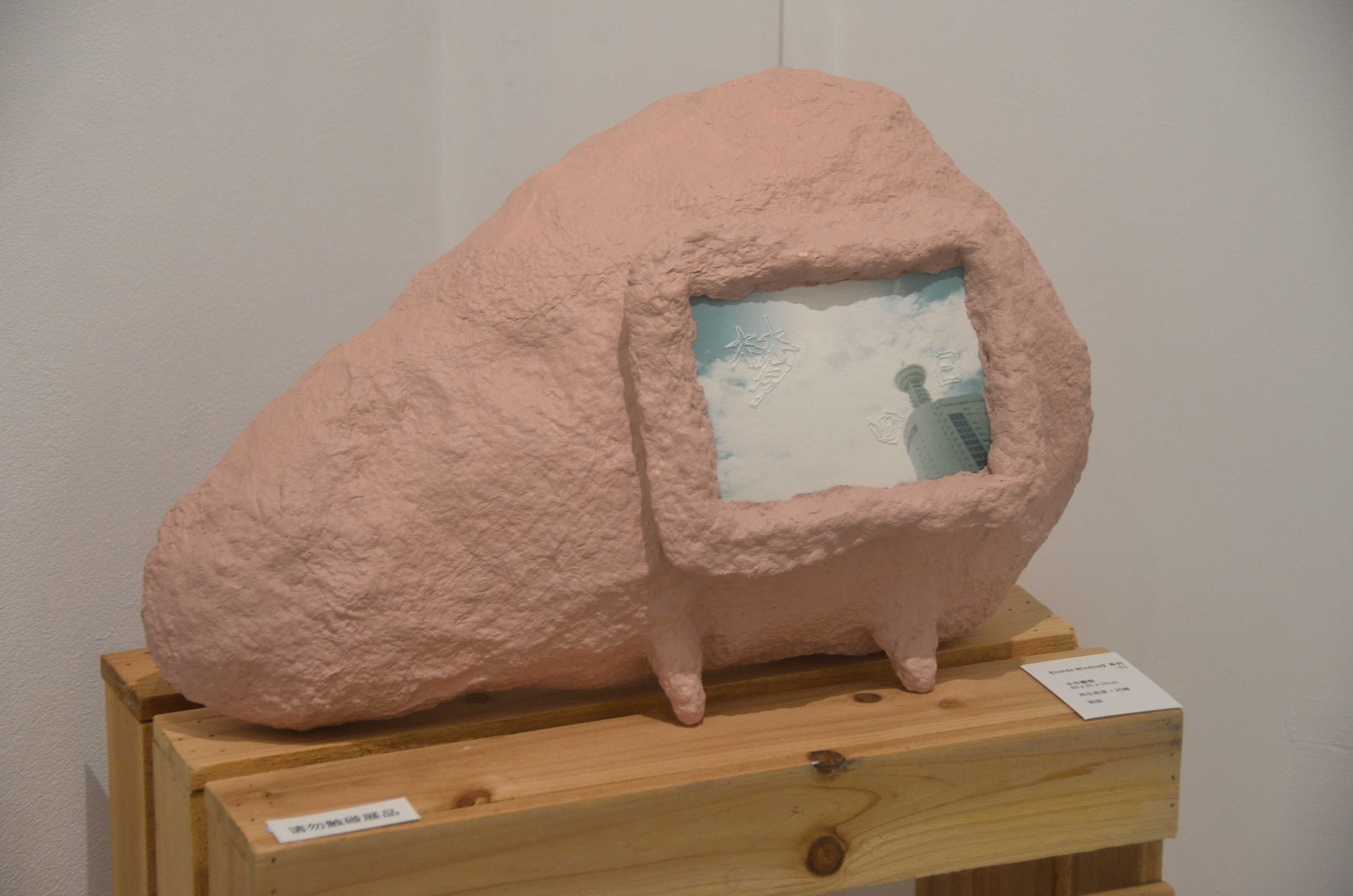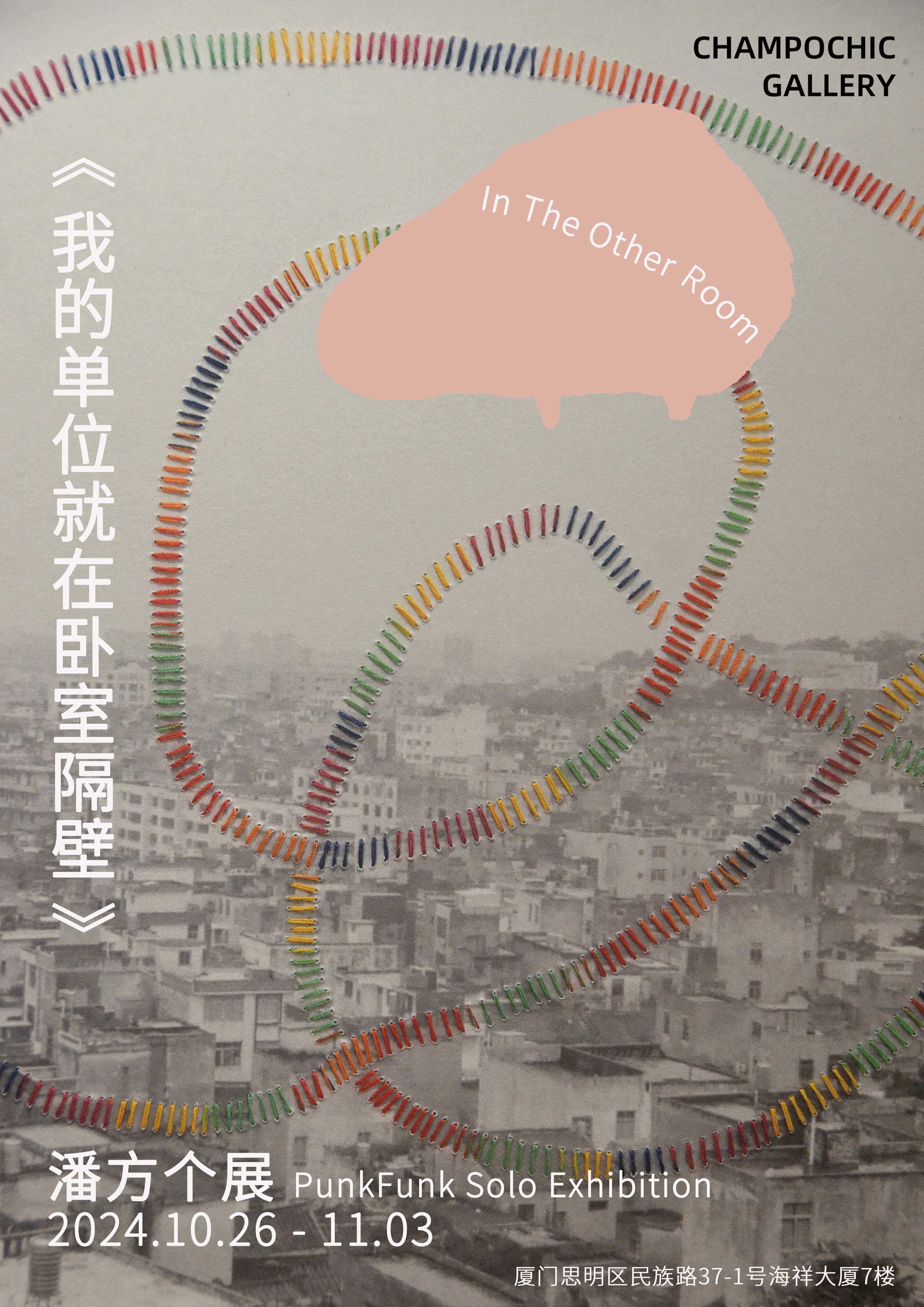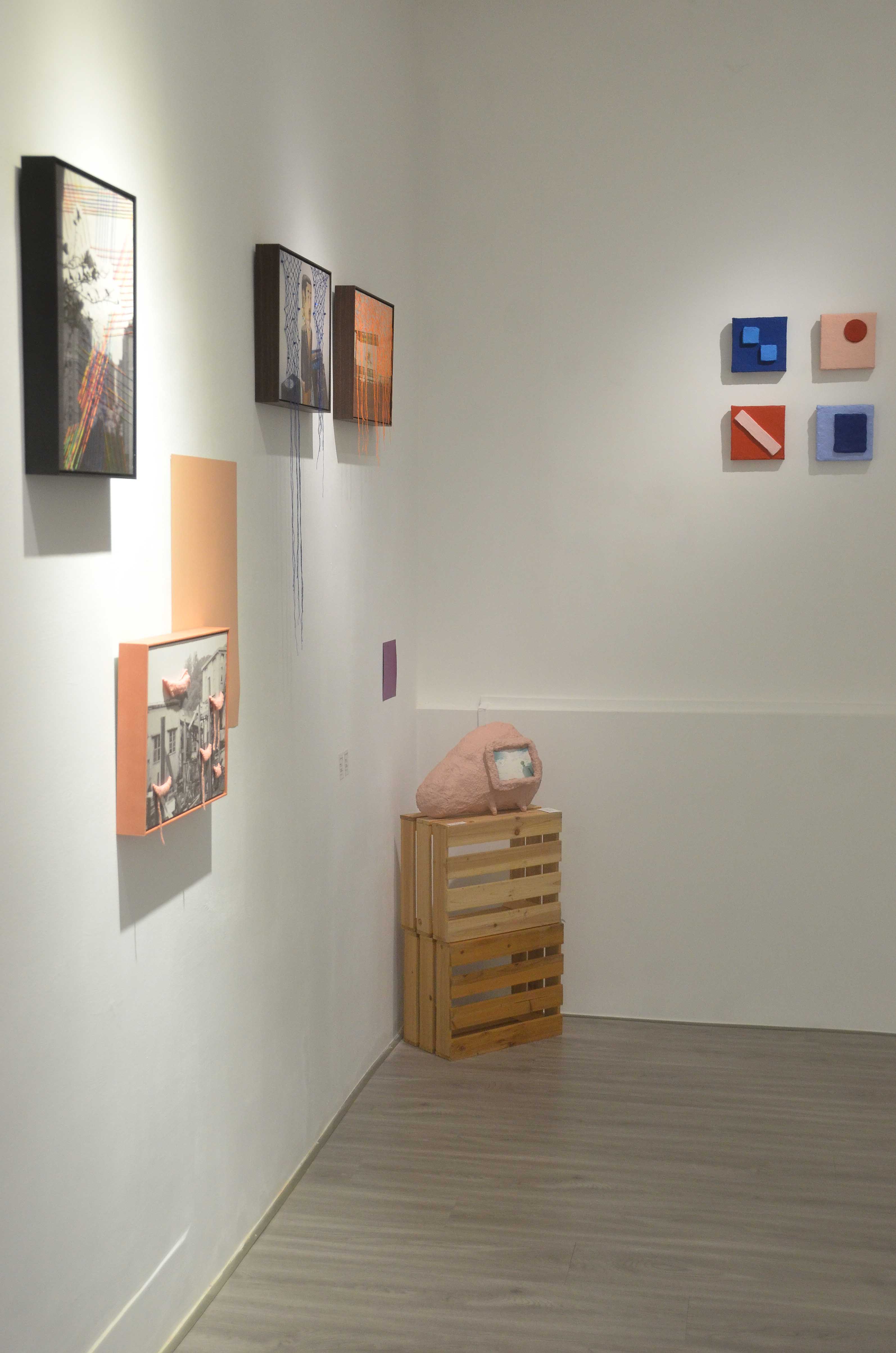













「我的单位就在卧室隔壁 In The Other Room」|潘方PunkFunk 艺术家个展 ---(2024.10.26 - 11.03)
.
.
是什么造就一位艺术家?(What makes an artist?)
会创作的人,他们身上好像带着某种无法轻易透析,又有点抽象的“力量”。说不清是他们的“出厂设置”呢,还是某些特殊的经历所形成的结果。当然也可能是前后者之间无数次的偶然碰撞,形成了这样闪耀又独特的存在。
艺术家的个体特性,最终塑造了Ta的作品。个体在一条时间线上,从Ta决定创作或者无意识地参与创作的那一刻起,对于生命的思索便在时间线上蔓延开来。从此,生活与创作是两条不断交织的道路,连接着过去,当下与未来。从对于材料的好奇,到对于意义的追求,用技法与技术(动手能力),去呈现自己心中所想。现实中,缺乏这样“力量”的艺术家,将被生活所打败。
但这份“力量”究竟是什么呢?
在散步时刻Gallery即将开启的新展:《我的单位就在卧室隔壁》潘方个展,便是一场关于个体生长、关于艺术家用“力量”面对未知的展览。通过艺术家潘方的作品,我们期望为观众开启一个视角,一起进入“创作在生活里的样子”。
在创作初始阶段的潘方沉迷于刺绣手作,同时她将所习得的技能运用到架上作品,如呈现了一系列的“翻花绳”作品。在这个创作历程上的转折点,潘方从手作生产的意识形态进阶到在创作上对于观念的思考。
2022年,潘方在散步去艺术商店做了一场名为《漫无目的的游荡》的个人展览,呈现了一系列将刺绣运用在摄影作品上的作品,让观者仿佛看到艺术家在一个个遥远的记忆里跳舞。
潘方一直是凭着审美经验与直觉在创作的艺术家。
大学的漆画专业为她打下了艺术的基础,但“阅读”潘方的作品之后,会发现她的创作源泉更多来自于生活。不同阶段的创作呼应着不同阶段的人生。她在手工艺和艺术家的想象之间来回穿梭,在2023-2024年期间,刺绣摄影作品系列进入了新的阶段。在这个系列上,她从一种实验的态度,转向更加成熟和自如的呈现。同时,潘方的兴趣爱好也蔓延到纸浆这个媒介,她的创作宇宙一如既往地在不断扩展。
在这次展出的作品中,将覆盖潘方不同时期的创作,包含手作、架上、摄影、纸浆等不同媒介。通过“过去”、“当下”和“未来”三个板块,将呈现艺术家创作历程的一次记录(过去)、“一兜子彩虹”摄影作品系列(当下)和首次亮相的纸浆雕塑摆件(未来)。
其中,纸浆雕塑的出现,源于潘方近年来对于自制纸的实验。再次走上新材料的探索,却也是艺术思维上的新篇章。过去的摄影系列,围绕着对于现实的截取和重构的概念。而纸浆雕塑的创作更像是面对一张空白的画布,潘方从零去创造来到这个世界上的“物”。
在空白里,她能够创造出什么?明天的PUNKFUNK 又是什么?
What makes an artist?
Creators, are these people whom seem to possess a kind of abstract and immeasurable “energy”. It’s hard to determine whether it’s of one’s innate character, or perhaps the sum of specific experiences that lead up to a point. More likely, the combination of the former and latter, coming together to form the dazzling and unique existence of an creative individual.
Oddball personality and distinct characteristics of artists, ultimately manifest themselves into their work. From the moment they decide to enter the creative sphere, their pursuits of meaning and contemplation of life itself spreads throughout their remaining timeline. Life and artistic pursuit become two intertwined paths, connecting the past, present and future.
Active and curious towards different mediums and materials, pursuing deeper thinking around philosophical concepts, artists apply their capability and skill in attempt to convey their ideas and expression “energetically” to the outside world. In reality, the artists whom lack this “energy” will eventually fall to defeat.
But how do we define the idea of “energy” in this particular context?
The upcoming new exhibition at Champochic gallery,《In The Other Room》Punk Funk Solo Exhibition, is a showcase of individual growth and about how an artist uses her "energy" to face the unknown. Through the works of artist Punk Funk, we hope to open up a perspective for the audience.
In the beginning of her creative career, Punk Funk was strongly drawn to the crafts of embroidery. She was able to apply acquired skills of this particular medium to works of canvas. An example of this is the《翻花绳》 series. This marked a turning point in the artist’s creative process. Her ideologies behind hand-making took a turn and a seed of thought was planted as she began to question for meaning.
In 2022, the Champochic Art Shop held a solo exhibition called 《Aimless》. In this particular exhibition, Punk Funk presented a series of work that applied embroidery to photography, poetically inviting the audience to witness an artist dancing in her own distant memories. Punk Funk has always been an artist whom relied heavily on her personal aesthetic experience and intuition.
It would seem the artist’s university major in lacquer painting laid the foundations for her artistic prowess, but taking a quick glance at her work, one could see that the source of her creativity lies mostly in her life experience. Different stages of her work corresponds to different stages of her life. As she shuttles back and forth between “doing crafts” and diving into her own imagination, in 2023-2024, her embroidery photography series entered a new phase. From an more experimental standpoint, Punk Funk now possesses a more mature and confident presentation of her work. Meanwhile, she starts to develop an interest for paper making, exploring ways of making paper structures.
Her creative universe continues to expand as always.
In this exhibition, works from different periods, including handicrafts, work on canvas, photography, paper-making and other different media are presented. Through the three sections of 'past', 'present', and 'future', the exhibition will present a “documented” record of the artist's creative process, a series of photographic works titled “A Pocketful of Rainbow”, and the debut of her paper pulp sculptures.
The emergence of paper pulp sculptures originates from the artist’s recent experiments with paper-making. The exploration of new materials also marks a new chapter in her artistic ideology. While the past photography series revolved around the concept of capturing and reconstructing reality, forming sculptures is more like facing a blank canvas, building "objects" from scratch that come into this world.
What will she create?
Where does tomorrow lie?
会创作的人,他们身上好像带着某种无法轻易透析,又有点抽象的“力量”。说不清是他们的“出厂设置”呢,还是某些特殊的经历所形成的结果。当然也可能是前后者之间无数次的偶然碰撞,形成了这样闪耀又独特的存在。
艺术家的个体特性,最终塑造了Ta的作品。个体在一条时间线上,从Ta决定创作或者无意识地参与创作的那一刻起,对于生命的思索便在时间线上蔓延开来。从此,生活与创作是两条不断交织的道路,连接着过去,当下与未来。从对于材料的好奇,到对于意义的追求,用技法与技术(动手能力),去呈现自己心中所想。现实中,缺乏这样“力量”的艺术家,将被生活所打败。
但这份“力量”究竟是什么呢?
在散步时刻Gallery即将开启的新展:《我的单位就在卧室隔壁》潘方个展,便是一场关于个体生长、关于艺术家用“力量”面对未知的展览。通过艺术家潘方的作品,我们期望为观众开启一个视角,一起进入“创作在生活里的样子”。
在创作初始阶段的潘方沉迷于刺绣手作,同时她将所习得的技能运用到架上作品,如呈现了一系列的“翻花绳”作品。在这个创作历程上的转折点,潘方从手作生产的意识形态进阶到在创作上对于观念的思考。
2022年,潘方在散步去艺术商店做了一场名为《漫无目的的游荡》的个人展览,呈现了一系列将刺绣运用在摄影作品上的作品,让观者仿佛看到艺术家在一个个遥远的记忆里跳舞。
潘方一直是凭着审美经验与直觉在创作的艺术家。
大学的漆画专业为她打下了艺术的基础,但“阅读”潘方的作品之后,会发现她的创作源泉更多来自于生活。不同阶段的创作呼应着不同阶段的人生。她在手工艺和艺术家的想象之间来回穿梭,在2023-2024年期间,刺绣摄影作品系列进入了新的阶段。在这个系列上,她从一种实验的态度,转向更加成熟和自如的呈现。同时,潘方的兴趣爱好也蔓延到纸浆这个媒介,她的创作宇宙一如既往地在不断扩展。
在这次展出的作品中,将覆盖潘方不同时期的创作,包含手作、架上、摄影、纸浆等不同媒介。通过“过去”、“当下”和“未来”三个板块,将呈现艺术家创作历程的一次记录(过去)、“一兜子彩虹”摄影作品系列(当下)和首次亮相的纸浆雕塑摆件(未来)。
其中,纸浆雕塑的出现,源于潘方近年来对于自制纸的实验。再次走上新材料的探索,却也是艺术思维上的新篇章。过去的摄影系列,围绕着对于现实的截取和重构的概念。而纸浆雕塑的创作更像是面对一张空白的画布,潘方从零去创造来到这个世界上的“物”。
在空白里,她能够创造出什么?明天的PUNKFUNK 又是什么?
What makes an artist?
Creators, are these people whom seem to possess a kind of abstract and immeasurable “energy”. It’s hard to determine whether it’s of one’s innate character, or perhaps the sum of specific experiences that lead up to a point. More likely, the combination of the former and latter, coming together to form the dazzling and unique existence of an creative individual.
Oddball personality and distinct characteristics of artists, ultimately manifest themselves into their work. From the moment they decide to enter the creative sphere, their pursuits of meaning and contemplation of life itself spreads throughout their remaining timeline. Life and artistic pursuit become two intertwined paths, connecting the past, present and future.
Active and curious towards different mediums and materials, pursuing deeper thinking around philosophical concepts, artists apply their capability and skill in attempt to convey their ideas and expression “energetically” to the outside world. In reality, the artists whom lack this “energy” will eventually fall to defeat.
But how do we define the idea of “energy” in this particular context?
The upcoming new exhibition at Champochic gallery,《In The Other Room》Punk Funk Solo Exhibition, is a showcase of individual growth and about how an artist uses her "energy" to face the unknown. Through the works of artist Punk Funk, we hope to open up a perspective for the audience.
In the beginning of her creative career, Punk Funk was strongly drawn to the crafts of embroidery. She was able to apply acquired skills of this particular medium to works of canvas. An example of this is the《翻花绳》 series. This marked a turning point in the artist’s creative process. Her ideologies behind hand-making took a turn and a seed of thought was planted as she began to question for meaning.
In 2022, the Champochic Art Shop held a solo exhibition called 《Aimless》. In this particular exhibition, Punk Funk presented a series of work that applied embroidery to photography, poetically inviting the audience to witness an artist dancing in her own distant memories. Punk Funk has always been an artist whom relied heavily on her personal aesthetic experience and intuition.
It would seem the artist’s university major in lacquer painting laid the foundations for her artistic prowess, but taking a quick glance at her work, one could see that the source of her creativity lies mostly in her life experience. Different stages of her work corresponds to different stages of her life. As she shuttles back and forth between “doing crafts” and diving into her own imagination, in 2023-2024, her embroidery photography series entered a new phase. From an more experimental standpoint, Punk Funk now possesses a more mature and confident presentation of her work. Meanwhile, she starts to develop an interest for paper making, exploring ways of making paper structures.
Her creative universe continues to expand as always.
In this exhibition, works from different periods, including handicrafts, work on canvas, photography, paper-making and other different media are presented. Through the three sections of 'past', 'present', and 'future', the exhibition will present a “documented” record of the artist's creative process, a series of photographic works titled “A Pocketful of Rainbow”, and the debut of her paper pulp sculptures.
The emergence of paper pulp sculptures originates from the artist’s recent experiments with paper-making. The exploration of new materials also marks a new chapter in her artistic ideology. While the past photography series revolved around the concept of capturing and reconstructing reality, forming sculptures is more like facing a blank canvas, building "objects" from scratch that come into this world.
What will she create?
Where does tomorrow lie?